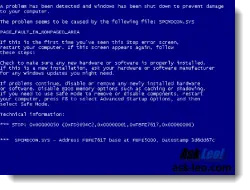There are a couple of different things that could be going on, but as you’re just trying to grab the data off of that PC, you have a few options.
The solution for this depends on the version of Windows that you have and from your description, I can’t tell what you’re running, so I’ll look at some of the most common solutions.
When it’s malware
If you suspect that this is malware, you’ll probably need to run a standalone anti-malware tool, such as Windows Defender Offline. Simply download the anti-malware tool, burn it to a CD or DVD on your new PC, and then boot the old computer using it.
That CD or DVD will boot directly into the anti-malware tool so you can do a full scan of the hard disk on the infected machine. It’s possible that this is simply malware and if it is, Windows Defender Offline could fix it so you could have a bootable machine again.
You may want to look at an article I have called “Windows Defender Offline – scan your computer for malware without booting Windows” for more details on this approach.
So let’s say you do this and it doesn’t fix the problem on your machine. Now what?
 Repair install
Repair install
The next thing that I would try is a repair install of Windows. How this works depends on which version of Windows you’re running.
For most versions, you can reboot that old PC from its installation media; the disc that you would have set up Windows from originally. You would then select Install, but then make certain to select the option to “Overwrite the existing copy of Windows but keep all of the settings.” How do I repair Windows 7 with a re-install? covers the steps for Windows 7.
If you don’t have the original installation media and you want to save the machine, you might check with the original vendor to see if there are other recovery options. Ultimately, though, you may have to buy installation media from a reseller.
But in your scenario, you just want to get some files. You’re in a more flexible position than most people.
Repurpose your machine’s harddisk
If all you want is the data I would do either one of two things:
- Boot from a Linux disc. Go grab a copy of the latest version of Ubuntu on your new machine, burn it to a DVD, and boot your old machine to access the hard drive. In fact, you should then be able to plug in an external hard drive, a USB thumb drive, or other device to start copying files from the old machine and then move them from your device to the new machine. Once you have the files, you can reformat and reinstall a different operating system or reinstall Windows from scratch (remember, it will overwrite your files).
- Create an external hard drive. Put the old computer’s hard disk into an external drive enclosure and boom, you’ve got an external hard drive. When you plug it into your new machine, that external hard drive will have all of your old files from the old machine on it. That’s a great way to recover data. After you’re done with recovery (and of course appropriately backing up), then you could actually go ahead and reformat that external hard drive so you can use it for whatever you like.
So, don’t worry about lost data. There’s several ways to at least get your data off there and there are a couple of approaches which (with a little bit of luck) may get you a working system again as well.
 Repair install
Repair install
This exactly to the letter problem caused me months of headaches, because sometimes it would fully boot and at others it was just like the comment being discussed. Every fix offered from many forums (including ghosting back to an older image) failed so I took matters into my own hands haha. First I checked the looms on the starter buttom from inside the case by pulling them and then pushing back of, and wow…. it seemed to fix it and the computer worked like a charm for 2 days… but then reverted to its old tricks. I was about to trash it and actually looked online for another, but at the last minute decided to follow all cables going from the switch to the MOBO and found one wire where the loom was a bit loose, so I pushed it on hard and tried again and it worked perfectly from that day on. So I duct taped the wire in a permanant position so it would remain tight and all is great now. Been 3 months now without even one dropout. I think when I first played with the start button wiring I must have put pressure on the other end that hooked onto the MOBO and thats why it was temporarily fixed. So… CHECK ALL WIRING LOOMS.
Hope this helps…. Mike
Similar to Mikey above.
Another one was my HP. I had the front off the case to give room for the CD drive to work properly; worked fine for months.
Then, I powered on, it started loading Windows, then shut down (not abruptly). Being of a nasty, suspicious mind, I looked at the power switch. It is a push-on, push off type and was stuck in, probably by a bit of dirt or something. A quick shot of component cleaner cleaned it right up and it’s worked fine ever since — 2 years now.
I have a desktop that continually reboots. It’s a hardware issue. Some of the capacitors on the mother board have “crowned”, and are leaking current, so when you try to do too much at one time, the system can’t handle it, and shuts down, then reboots (most of the time-sometimes you have to manually reboot).